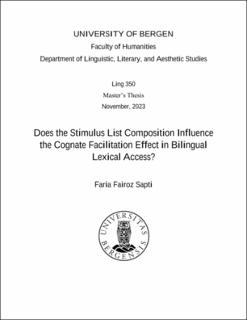| dc.description.abstract | The research explores the impact of stimulus list composition on cognate processing in Norwegian-English bilinguals through three lexical decision experiments in English with different stimulus list arrangements. The first experiment used a pure stimulus list containing cognates (words that are orthographically and semantically similar between the two languages), non-cognates, and true non-words, revealing a significant and strong cognate facilitation effect, that is, cognates were processed much faster than non-cognates. The second experiment introduced Norwegian words (from participants’ L1, which should be classified as non-words in the context of the experiment) alongside the stimuli from the first experiment, unexpectedly also demonstrating evidence for the strong cognate facilitation effect. In the third experiment, interlingual homographs (words that are orthographically similar but semantically different in the two languages) were included in the stimulus list, and once again, a substantial and significant cognate facilitation effect was observed. Overall, all three experiments consistently indicated a clear cognate facilitation effect, supporting the theory of non-selective language access. The study's results were examined in light of the Bilingual Interactive Activation Plus (BIA+) model predictions concerning stimulus list composition effects and processing. According to the BIA+ model predictions, the degree of orthographic cross-linguistic similarity also affects the size of the cognate facilitation effect meaning stimulus list composition can be one of the factors that triggers increased response competition and thus negate the cognate facilitation effect. However, the results of this study contradict the BIA+ model predictions, revealing a notable cognate facilitation effect across all three experiments. | |
